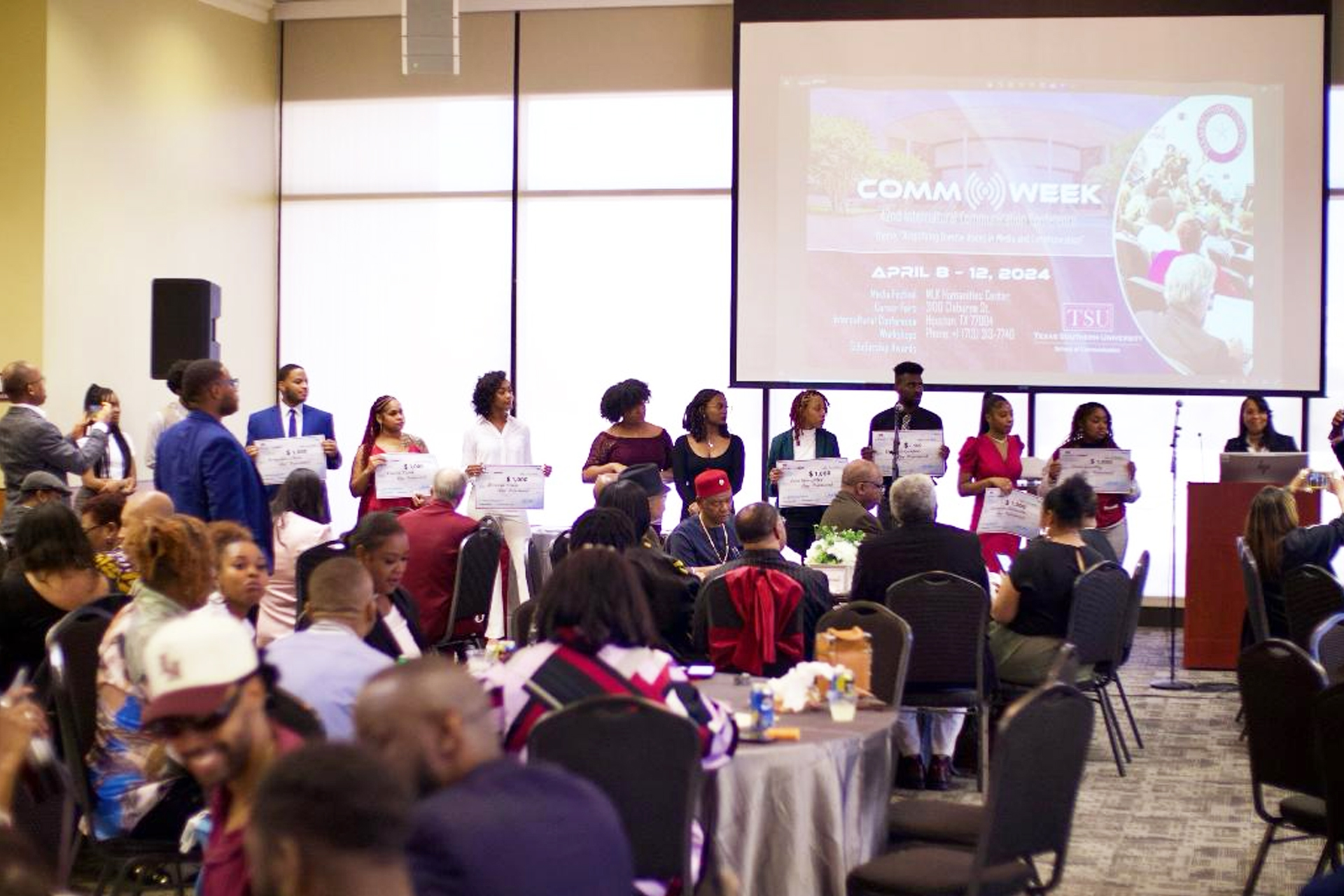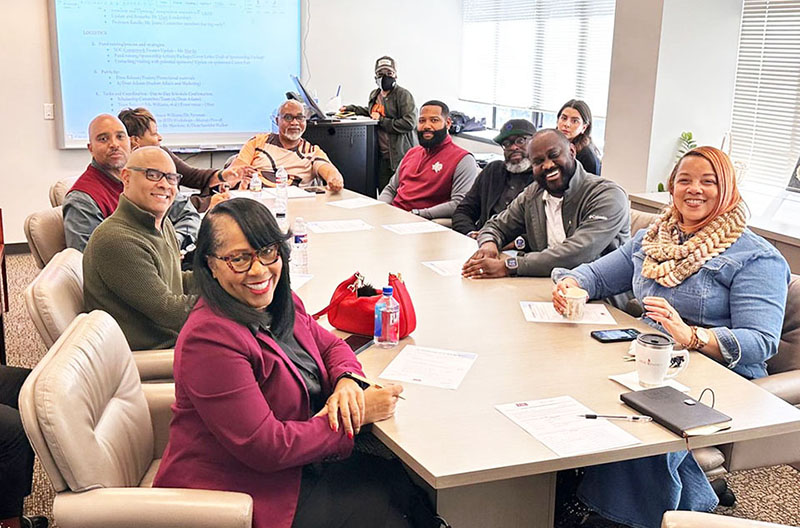Education
11 Communication Students Awarded Scholarships at TSU’s Commweek

- JD Vance breaks polling records in the worst way - July 25, 2024
- Donald Trump’s Losing Election Poll for First Time in Over a Month - July 25, 2024
- FBI Is Not Fully Convinced Trump Was Struck by a Bullet - July 25, 2024
Education
Nigerian Appointed First Female Chancellor of the University of Birmingham

Nigerian, Sandie Okoro OBE has been appointed by the University of Birmingham as its new Chancellor. With her appointment, she becomes the first female to be appointed chancellor by the university since its establishment over 100 years ago.
Okoro, a lawyer and diversity expert is currently the Group General Counsel of Standard Chartered where she leads the Bank’s Legal, Group Corporate Secretariat, and Shared Investigative Services functions.
Okoro will succeed Lord Bilimoria of Chelse CBE who will step down after 10 years in the role on July 10.
Speaking on her appointment, she said:
I am truly honoured and delighted to be appointed Chancellor. It’s a fantastic opportunity for me to give a little something back to the amazing University that has given so very much to me and my family.
“The wonderful University of Birmingham is the alma mater to three generations of the Okoros, my mum, me and my son. So my connection to it is very special indeed. I have followed the University’s outstanding progress very closely since my days there as a student on a full grant back in the 1980s – its dedication to impactful research, its focus on creating an inclusive environment for talented, minority students and educational excellence are themes very close to my heart.
Okoro, an alumna of the University of Birmingham is a graduate of Law and Politics qualifying as a barrister at the City, University of London. She has held roles as Head of Legal for Corporate Services at Schroders, Global General Counsel at Barings, and General Counsel for HSBC Global Asset Management. Okoro was also Senior Vice-President and General Counsel, and Vice-President for Compliance, for the World Bank Group.
She is a 2024 officer of the Order of the British Empire (OBE) and an Honorary Bencher of the Middle Temple.
- JD Vance breaks polling records in the worst way - July 25, 2024
- Donald Trump’s Losing Election Poll for First Time in Over a Month - July 25, 2024
- FBI Is Not Fully Convinced Trump Was Struck by a Bullet - July 25, 2024
Education
Black teen in Georgia awarded over $14m in scholarships, accepted at 231 colleges

An 18-year-old low-income student has just defied the odds by achieving an extraordinary feat in her pursuit of higher education.
Madison Crowell, from Hinesville, Georgia secured her acceptance into an astounding 231 colleges and universities across the nation. She has also been awarded an impressive $14.7 million in scholarships to support her academic journey.
Crowell’s remarkable achievement is not only a testament to her academic prowess but also to her unwavering determination and resilience in the face of adversity.
Growing up in a low-income community, she explained she was driven by a desire to showcase the possibilities available to students like herself.
“I wanted to apply to as many schools as I did because I want to show the kids here in Liberty County that it’s possible to get accepted into schools […] that you think might be out of your reach but is definitely in reach,” she told Good Morning America.
Despite facing challenges along the way, Crowell remained steadfast in her pursuit of higher education. With the support of her parents, Sgt. 1st Class Delando Langley and Melissa Langley, she embarked on college tours and road trips from a young age, preparing herself for the journey ahead.
Now, as she prepares to embark on her college adventure, Crowell’s hard work and determination have paid off. She has chosen to attend High Point University in High Point, North Carolina, where she will pursue her academic aspirations under a full tuition scholarship.
In response to her incredible achievement, High Point University President Dr. Nido Qubein extended a warm welcome to Crowell, recognizing her potential to achieve greatness.
“We welcome you to our HPU family”, he said. “You’re going to do exceptional things right here at The Premier Life Skills University, where we call everybody to be extraordinary. The sky is not the limit […] and when you come here to High Point University, we know you’ll be a leader. We know you’ll make amazing things happen. We’re here to resource her, cheer you on and celebrate you victory.”
Despite her overwhelming number of acceptances, Cromwell revealed she hadn’t been accepted to other top schools and urged other students to persevere.
“I know what it’s like to be deferred from a dream school and you don’t know if you’re gonna get the chance to apply again or you’re not going to be accepted again,” she said. “I just want to make it known that nothing is impossible and that the sky is not the limit and that you want to keep pushing for greatness.”
- JD Vance breaks polling records in the worst way - July 25, 2024
- Donald Trump’s Losing Election Poll for First Time in Over a Month - July 25, 2024
- FBI Is Not Fully Convinced Trump Was Struck by a Bullet - July 25, 2024
Education
TSU Announces 2024 Annual Communication Week

TEXAS INTERNATIONAL GUARDIAN, HOUSTON, TX – The representation of diverse racial and ethnic groups, as well as sexual and gender identities in the media, is critically important because it accurately shapes decency, fairness, and unity in the community. When media lacks or portrays insensitive representations, it can perpetuate harmful stereotypes and discrimination, further marginalizing these identities.
The School of Communication (SOC) at the Texas Southern University (TSU) has announced its 2024 Commweek, signifying the 42nd Intercultural and Communication Conference. Themed “Amplifying Diverse Voices in Media and Communication”, the conference will be held April 8 – 12, 2024, and will culminate with an Awards Gala on Friday, April 12, 2024, at the University’s Tiger Room.
Ensuring a diversity of voices in the media requires holistic monitoring systems and the wider application of target-based measures for both public and private media. Amplifying diverse perspectives can instigate a richer and more inclusive media landscape that benefits the entire populace. The Intercultural Communication Conference provides a forum for scholars, students, professionals, and civic-minded leaders to explore topics with cultural, political, economic, and social implications as well as communication dynamics. But the theme is necessary and also, it is coming at the right time.
The challenges posed by a lack of diverse voices in media and communication can be seen across social, political, economic, and cultural spheres of influence. These issues can influence the views represented in news coverage and dissemination. Indeed, the diversity of perspectives is key to creating a more inclusive and equitable society.
According to Dr. Chris Ulasi, the Interim Dean of the School of Communication, “The 2024 event will be special because we are equally raising scholarship funds for gifted and economically disadvantaged students in the School of Communication. Traditionally, a majority of our students rely on some form of financial assistance to fund their education. This is why I am using this opportunity to appeal to individuals, corporations, and community organizations to support this cause.”
According to a release made available to our newsroom, proceeds from this event will,
- Help SOC students break down financial barriers while pursuing their academic prospects.
- Help SOC students cover the cost of tuition, textbooks, and other educational expenses.
- Help SOC students supplement the cost-of-living expenses such as housing, transportation, and food.
- Create retention possibilities for students who might drop out for financial reasons.
- Act as incentives and encouragement to students in general.
- This financial sponsorship will be a catalyst for expanding SOC’s ongoing professional relationship with corporate businesses, community organizations, and individual sponsors.
Dr. Anthony Ogbo, co-chaired by Professor Ladonia Randle, and Ms. Michele Jones, is joined by a team of very engaging and supportive members who meet regularly to finalize the machinery for a successful event. According to Dr. Ogbo, “The 2024 Commweek is expected to draw a line-up of dignitaries from the business, academic, and government sectors. For instance, the City of Houston’s Vice Mayor Pro-Tem, Council Member Martha Castex-Tatum will lead the conference opening ceremony on Monday, April 8. Also, Dr. Kathleen McElroy, renowned Journalist and Professor at the School of Journalism and Media at The University of Texas at Austin will lead the opening session of the intercultural conference on Thursday, April 10.”
The School of Communication (SOC) at Texas Southern University is a transformational, interdisciplinary academic school with four departments and two graduate programs: Communication Studies; Entertainment Recording Industry Management (ERIM); Journalism; Radio, Television, and Film (RTF); and Master of Arts (MA) in Communication and Master of Arts (M.A.) in Professional Communication and Digital Media (PCDM). For 48 years, the school has been at the forefront of training culturally responsive professionals and scholars who can navigate urban and international settings with a deep sense of inclusivity and an understanding of historical legacy.
Texas Southern University possesses an impressive array of more than 100 undergraduate and graduate programs and concentrations, a diverse faculty, 80-plus student organizations, and an extensive alumni network comprised of educators, entrepreneurs, public servants, lawyers, pilots, artists, and more, many of whom are change agents on the local, national and international stage. Nestled upon a sprawling 150-acre campus, Texas Southern University is one of the nation’s largest historically black universities.
- JD Vance breaks polling records in the worst way - July 25, 2024
- Donald Trump’s Losing Election Poll for First Time in Over a Month - July 25, 2024
- FBI Is Not Fully Convinced Trump Was Struck by a Bullet - July 25, 2024
-

 Anthony Obi Ogbo2 days ago
Anthony Obi Ogbo2 days agoSylvester Turner Should Cancel His Bid for Late Jackson Lee’s Congressional Seat
-

 Anthony Obi Ogbo1 week ago
Anthony Obi Ogbo1 week agoWas Trump’s Assassin unstoppable because he was White?
-

 Column2 days ago
Column2 days agoAdvocating for Reviving the 1960s Constitution Toward Creating a United Region of Nigeria
-

 News2 weeks ago
News2 weeks agoOMG: Donald Trump Shooter Was a Registered Republican
-

 Lifestyle2 weeks ago
Lifestyle2 weeks agoEddie Murphy and Paige Butcher Are Married! Inside Their Private Caribbean Wedding
-

 News2 weeks ago
News2 weeks agoDonald Trump survives assassination attempt; FBI identifies shooter
-

 Houston2 weeks ago
Houston2 weeks agoHurricane Beryl: Wazobia postpones family fanfare slated for this weekend
-

 Lifestyle2 weeks ago
Lifestyle2 weeks agoYale honors a young Black scientist after a neighbor falsely reported the 9-year-old to the police



















